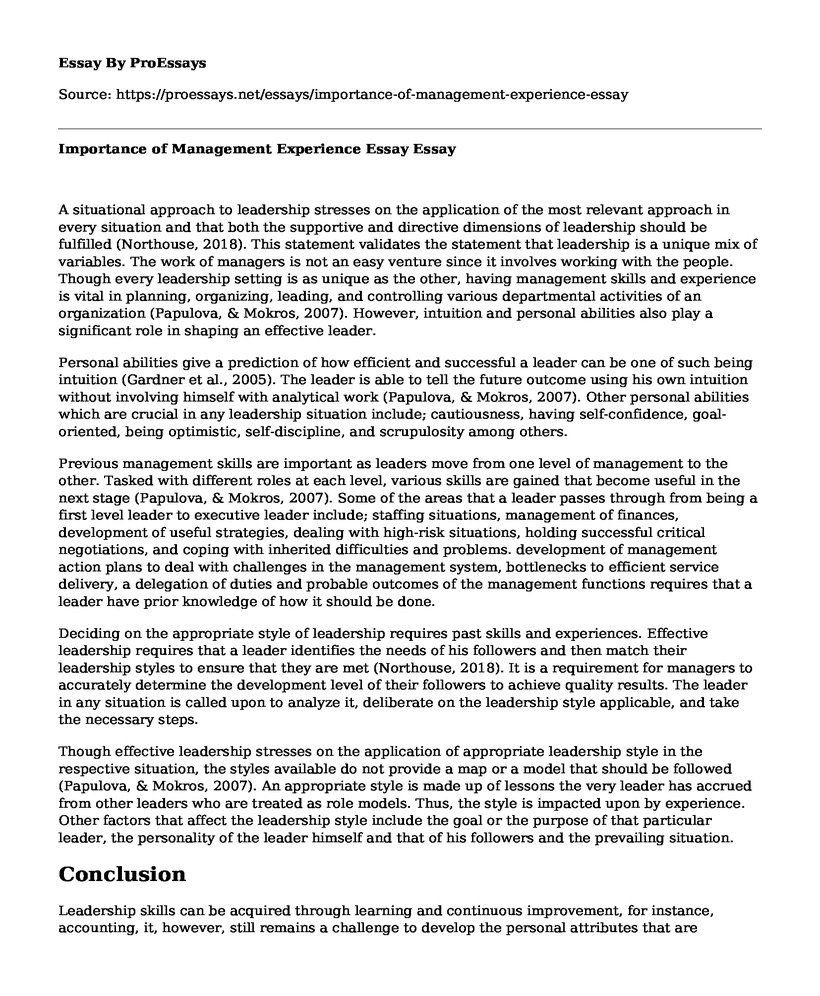A situational approach to leadership stresses on the application of the most relevant approach in every situation and that both the supportive and directive dimensions of leadership should be fulfilled (Northouse, 2018). This statement validates the statement that leadership is a unique mix of variables. The work of managers is not an easy venture since it involves working with the people. Though every leadership setting is as unique as the other, having management skills and experience is vital in planning, organizing, leading, and controlling various departmental activities of an organization (Papulova, & Mokros, 2007). However, intuition and personal abilities also play a significant role in shaping an effective leader.
Personal abilities give a prediction of how efficient and successful a leader can be one of such being intuition (Gardner et al., 2005). The leader is able to tell the future outcome using his own intuition without involving himself with analytical work (Papulova, & Mokros, 2007). Other personal abilities which are crucial in any leadership situation include; cautiousness, having self-confidence, goal-oriented, being optimistic, self-discipline, and scrupulosity among others.
Previous management skills are important as leaders move from one level of management to the other. Tasked with different roles at each level, various skills are gained that become useful in the next stage (Papulova, & Mokros, 2007). Some of the areas that a leader passes through from being a first level leader to executive leader include; staffing situations, management of finances, development of useful strategies, dealing with high-risk situations, holding successful critical negotiations, and coping with inherited difficulties and problems. development of management action plans to deal with challenges in the management system, bottlenecks to efficient service delivery, a delegation of duties and probable outcomes of the management functions requires that a leader have prior knowledge of how it should be done.
Deciding on the appropriate style of leadership requires past skills and experiences. Effective leadership requires that a leader identifies the needs of his followers and then match their leadership styles to ensure that they are met (Northouse, 2018). It is a requirement for managers to accurately determine the development level of their followers to achieve quality results. The leader in any situation is called upon to analyze it, deliberate on the leadership style applicable, and take the necessary steps.
Though effective leadership stresses on the application of appropriate leadership style in the respective situation, the styles available do not provide a map or a model that should be followed (Papulova, & Mokros, 2007). An appropriate style is made up of lessons the very leader has accrued from other leaders who are treated as role models. Thus, the style is impacted upon by experience. Other factors that affect the leadership style include the goal or the purpose of that particular leader, the personality of the leader himself and that of his followers and the prevailing situation.
Conclusion
Leadership skills can be acquired through learning and continuous improvement, for instance, accounting, it, however, still remains a challenge to develop the personal attributes that are necessary for effective leadership. Feedback plays a central role in the development of such traits such as coaching, evaluation, and the yearly review of performance (Papulova, & Mokros, 2007). Such a process takes time and prior skills are mandatory not only to make the appropriate decision for the company but also to ensure that best decisions are made at departmental levels.
Despite the fact that leaders can rely on intuition among other traits such as cautiousness, having self-confidence, goal-oriented, being optimistic, self-discipline, and scrupulosity, management experience stands out to be necessary for determining the appropriate leadership style to be applied in a given situation.
References
Gardner, W. L., Avolio, B. J., & Walumbwa, F. O. (Eds.). (2005). Authentic leadership theory and practice: Origins, effects and development (Vol. 3). Elsevier.
Northouse, P. G. (2018). Leadership: Theory and practice. Sage publications.
Papulova, Z., & Mokros, M. (2007). Importance of managerial skills and knowledge in management for small entrepreneurs. E-leader, Prague, 1-8.
Cite this page
Importance of Management Experience Essay. (2022, Jul 26). Retrieved from https://proessays.net/essays/importance-of-management-experience-essay
If you are the original author of this essay and no longer wish to have it published on the ProEssays website, please click below to request its removal:
- The Place of Leadership in Education in the UAE Research Paper
- Paper Example on Operations Forecasting
- Impact of Managers on Employee Retention Paper Example
- The Management of Pizza Palace Mini Case Review
- The Blue Cross Blue Shield of Massachusetts Scenario Planning Process Paper Example
- Assessing Team Dynamics: Strengths, Trust & Leadership - Essay Sample
- Essay Example on Working in a Team: My Experience and Critical Analysis







